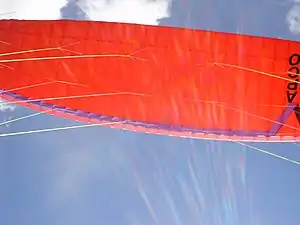| Fiesta | |
|---|---|
 | |
| Fiesta II | |
| Role | Paraglider |
| National origin | Israel |
| Manufacturer | Apco Aviation |
| Status | Production completed |
| Produced | mid-2000s |
The Apco Fiesta is a family of Israeli single-place and two-place paragliders that was designed and produced by Apco Aviation of Caesarea. It is now out of production.[1]
Design and development
The Fiesta was designed as a beginner glider, plus a tandem version for flight training, the Fiesta 42 Bi, indicting "bi-place" or two seater.[1]
The sail is made from 46gr/m2 "Zero Porosity" ripstop nylon.[2]
The design progressed through two generations of models, the Fiesta and Fiesta II. The two-place models in the line are named for their rough wing area in square metres, while the solo ones are named for their relative size.[1]
Variants
- Fiesta XS
- Extra small-sized model for lighter pilots. Its 11.2 m (36.7 ft) span wing has a wing area of 26.2 m2 (282 sq ft), 36 cells and the aspect ratio is 4.8:1. The pilot weight range is 63 to 79 kg (139 to 174 lb). The glider model is AFNOR Std certified.[1]
- Fiesta S Light Mountain
- Small-sized model for light-weight pilots. Its 11.56 m (37.9 ft) span wing has a wing area of 27.21 m2 (292.9 sq ft), 37 cells and the aspect ratio is 4.91:1. The pilot weight range is 73 to 90 kg (161 to 198 lb). The glider model is AFNOR Std certified.[1]
- Fiesta M
- Mid-sized model for medium-weight pilots. Its 11.56 m (37.9 ft) span wing has a wing area of 29.20 m2 (314.3 sq ft), 39 cells and the aspect ratio is 5.12:1. The pilot weight range is 85 to 105 kg (187 to 231 lb). The glider model is DHV 1 and AFNOR Std certified.[2]
- Fiesta L
- Large-sized model for heavier pilots. Its 12.9 m (42.3 ft) span wing has a wing area of 31.2 m2 (336 sq ft), 41 cells and the aspect ratio is 5.33:1. The pilot weight range is 100 to 120 kg (220 to 265 lb). The glider model is DHV 1 and AFNOR Std certified.[1]
- Fiesta 42 Bi
- Tandem two seat model for flight training. Its 15.09 m (49.5 ft) span wing has a wing area of 42 m2 (450 sq ft), 96 cells and the aspect ratio is 5.42:1. The pilot weight range is 140 to 210 kg (309 to 463 lb). The glider model is AFNOR Biplace certified.[1]
- Fiesta II XS
- Extra small-sized model for lighter pilots. Its 11.2 m (36.7 ft) span wing has a wing area of 26.2 m2 (282 sq ft), 36 cells and the aspect ratio is 4.8:1. The pilot weight range is 63 to 79 kg (139 to 174 lb). The glider model is AFNOR Std certified.[2]
- Fiesta II S
- Small-sized model for light-weight pilots. Its 11.56 m (37.9 ft) span wing has a wing area of 27.21 m2 (292.9 sq ft), 37 cells and the aspect ratio is 4.91:1. The pilot weight range is 73 to 90 kg (161 to 198 lb). The glider model is DHV 1 and AFNOR Std certified.[2]
- Fiesta II M
- Mid-sized model for medium-weight pilots. Its 11.56 m (37.9 ft) span wing has a wing area of 29.20 m2 (314.3 sq ft), 39 cells and the aspect ratio is 5.12:1. The pilot weight range is 85 to 105 kg (187 to 231 lb). The glider model is DHV 1 and AFNOR Std certified.[2]
- Fiesta II L
- Large-sized model for heavier pilots. Its 12.90 m (42.3 ft) span wing has a wing area of 31.2 m2 (336 sq ft), 41 cells and the aspect ratio is 5.33:1. The pilot weight range is 100 to 120 kg (220 to 265 lb). The glider model is DHV 1, AFNOR Std and DULV certified.[2]
- Fiesta II Tandem 43
- Tandem two seat model for flight training. Its 14.5 m (47.6 ft) span wing has a wing area of 43 m2 (460 sq ft), 37 cells and the aspect ratio is 4.91:1. The pilot weight range is 140 to 220 kg (309 to 485 lb). The glider model is DHV Tandem and DULV certified.[3]
Specifications (Fiesta L)
Data from Bertrand[1]
General characteristics
- Crew: one
- Wingspan: 12.9 m (42 ft 4 in)
- Wing area: 31.2 m2 (336 sq ft)
- Aspect ratio: 5.33:1
Performance
- Maximum speed: 45 km/h (28 mph, 24 kn)
- Rate of sink: 1.1 m/s (220 ft/min)
References
- 1 2 3 4 5 6 7 8 Bertrand, Noel; Rene Coulon; et al: World Directory of Leisure Aviation 2003-04, page 12. Pagefast Ltd, Lancaster OK, 2003. ISSN 1368-485X
- 1 2 3 4 5 6 Apco Aviation. "Apco Fiesta". Archived from the original on 20 September 2011. Retrieved 21 March 2016.
- ↑ Apco Aviation. "Apco Fiesta Tandem". Archived from the original on 3 August 2016. Retrieved 22 March 2016.
External links
Wikimedia Commons has media related to Apco Fiesta.
This article is issued from Wikipedia. The text is licensed under Creative Commons - Attribution - Sharealike. Additional terms may apply for the media files.